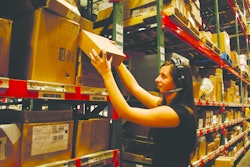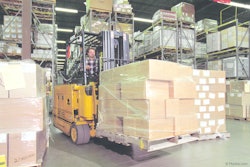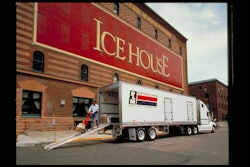A nationwide listeria outbreak in the United States that has killed 25 people who ate tainted cantaloupe was probably caused by unsanitary conditions in the packing shed of the Colorado farm where the melons were grown, US officials have said.
Government investigators said that workers had tramped through pools of water where listeria was likely to grow, tracking the deadly bacteria around the shed, which was operated by Jensen Farms, in Granada, Colorado. The pathogen was found on a conveyor belt for carrying cantaloupes, in a melon drying area and in a floor drain, among other places.
''You're rolling around cantaloupe on unclean[able] equipment and you're getting it wet and you're not cooling it - it provides the perfect environment for listeria growth and spread,'' says James Gorny, a senior food safety adviser at the Food and Drug Administration.
The outbreak, which began in late July, is the deadliest caused by foodborne disease in the United States since 1985. A total of 123 people in 26 states have fallen ill, including those who died, according to the Centers for Disease Control and Prevention.
Nicholas J. Parolisi Jr., a lawyer for Jensen Farms, says he could not comment on the FDA's accusations.
The farm had passed a food safety audit by an outside contractor just days before the outbreak began. Eric S. Jensen, a member of the family that runs the farm, said in an e-mail that the auditor had given the packing plant a score of 96 points out of 100.
FDA officials did not criticize the auditor directly. But Michael R. Taylor, deputy commissioner for foods, said the agency intended to establish standards for training of auditors and conducting of audits.
The food industry increasingly has come to rely on what it calls third-party audits of farms or processing plants to ensure the safety of food. But the auditors are hired by the companies being inspected, and their procedures are largely unregulated. In several recent food safety lapses, the facilities involved had passed third-party audits.
It was not clear how listeria had initially gotten into the packing shed, which officials described as an open-air structure with a concrete floor, a roof and no walls.
Listeria is frequently found in soil or manure, but tests of the soil on the farm did not turn up the bacteria. Officials said that a dump truck used to take culled melons to a cattle farm was parked near the processing shed and could have carried bacteria to the facility.
Jensen Farms, run by Mr. Jensen and his brother Ryan, had recently acquired a set of used machinery to improve the way it washed and dried its cantaloupes. The equipment had been used to clean potatoes and was not intended for use with cantaloupes, officials said. They said the equipment was corroded in places and built in a way that made it difficult to clean and sanitize.
An area used to dry the melons included a cloth cover that easily could have harbored the bacteria, according to a person who discussed the operation with the Jensens.
Officials also said that the cantaloupes had not been adequately cooled before they were placed in refrigerated storage, which could have caused condensation to form on the fruit, creating hospitable conditions for listeria. The bacteria grow well in wet or damp conditions and can also thrive in cold.
Dr. Gorny said that some of the conditions he described, including pools of water on the floor, had been noted during a visit in mid-September after the plant ceased operation and the equipment was dismantled. It was not clear whether investigators who had visited the plant while it was still in operation had seen the same unsanitary conditions.
Officials said that conditions at Jensen Farms were not typical of the produce industry.
''We have no reason to believe these factors are indicative of practices throughout the industry,'' says Sherri McGarry, a senior FDA adviser.
The outbreak is likely to focus new attention on the use of auditors in the food industry. Typically farms or processors are required by their customers, like supermarket or restaurant chains, to have an auditor evaluate their food safety procedures.
Jensen Farms hired an auditor called PrimusLabs, based in California, to inspect its facility. Primus gave the job to a subcontractor, Bio Food Safety, which is based in Texas. Jensen and Primus declined to provide a copy of the audit report.
Robert Stovicek, the president of PrimusLabs, says his company had reviewed the audit and found no problems in the way it had been conducted or in the auditor's conclusions.
''We thought he did a pretty good job,'' Mr. Stovicek says. He says the auditor, James M. DiIorio, had been doing audits for the company since March.
He says that Mr. DiIorio had received two one-week training courses as part of his preparation and had also gone on audits with other auditors.
Asked how Mr. DiIorio could have given high marks to a facility that the FDA described as a breeding ground for listeria, Mr. Stovicek says, ''There's lots of variations as to how people interpret unsanitary conditions.''
Mr. DiIorio did not return phone calls seeking comment.
Trevor V. Suslow, a professor of food safety at the University of California, Davis, says auditors might give farmers, processors and retailers a false sense of security. ''There needs to be training, certification and auditing of the auditors,'' he says.
Listeria can cause high fever and diarrhea, and cases can be especially severe among older people or those with weakened immune systems. Most of the people who died in the outbreak and many others who fell ill were elderly.
Herbert H. Stevens Jr., 84, of Littleton, Colorado, became ill with a high fever on Aug. 24, a couple of weeks after eating a cantaloupe bought at a King Soopers grocery store. He has been in the hospital or a nursing home ever since. Mr. Stevens has filed a lawsuit against Jensen Farms, says his lawyer, William Marler.
Mr. Stevens's daughter, Jeni A. Exley, says she worried that he would no longer be able to take care of himself once he finally was able to go home. ''He's surprised that he survived it, being that there's so many deaths,'' Ms. Exley says. ''We should be able to trust the US food supply, but I don't think you can right now.''



















